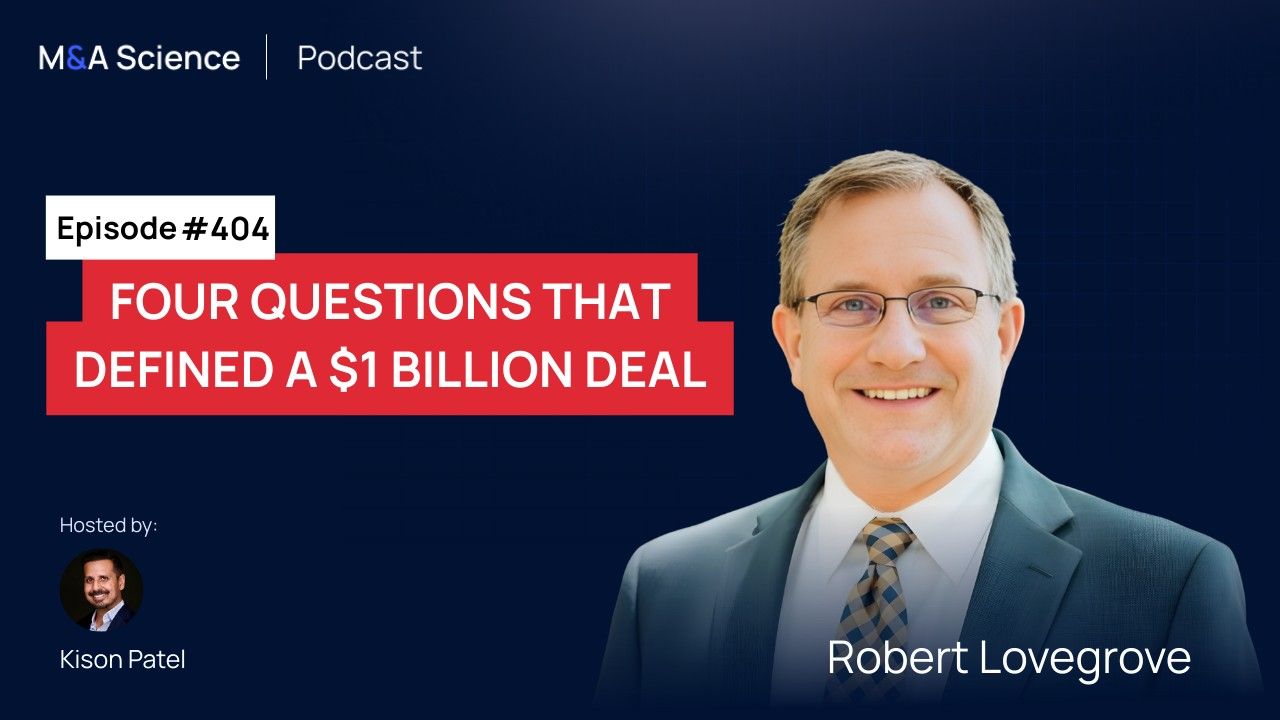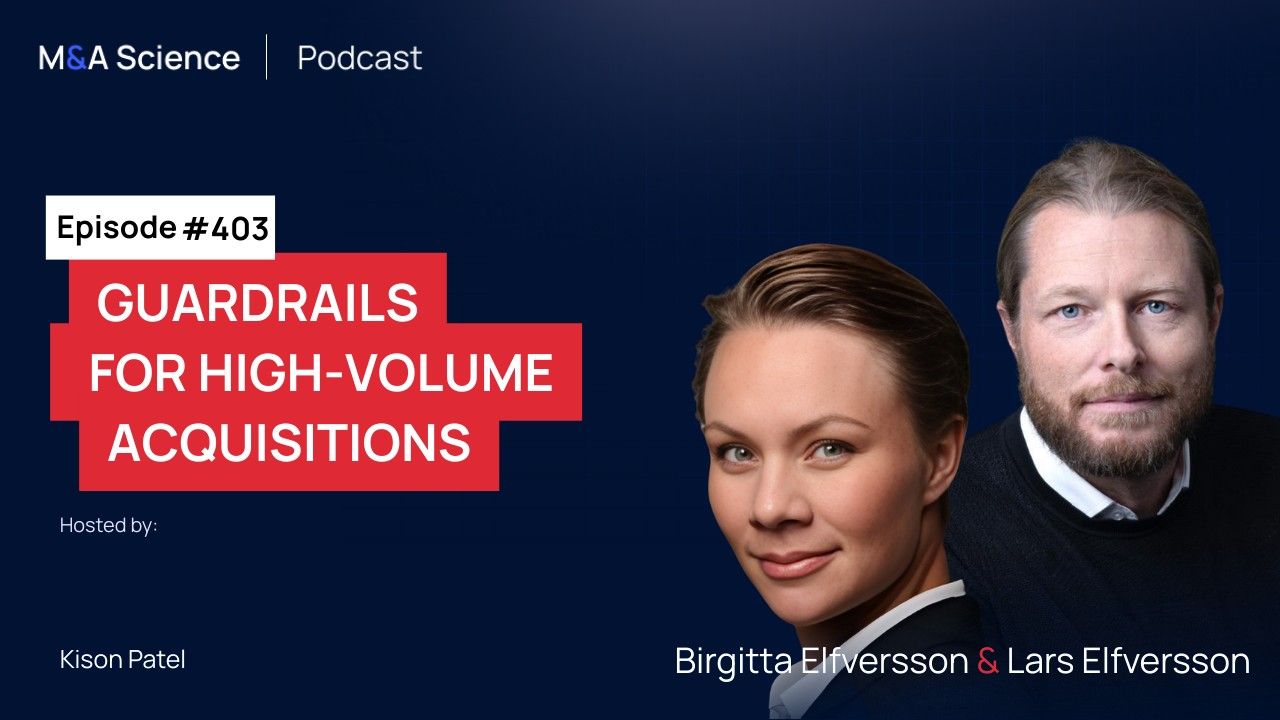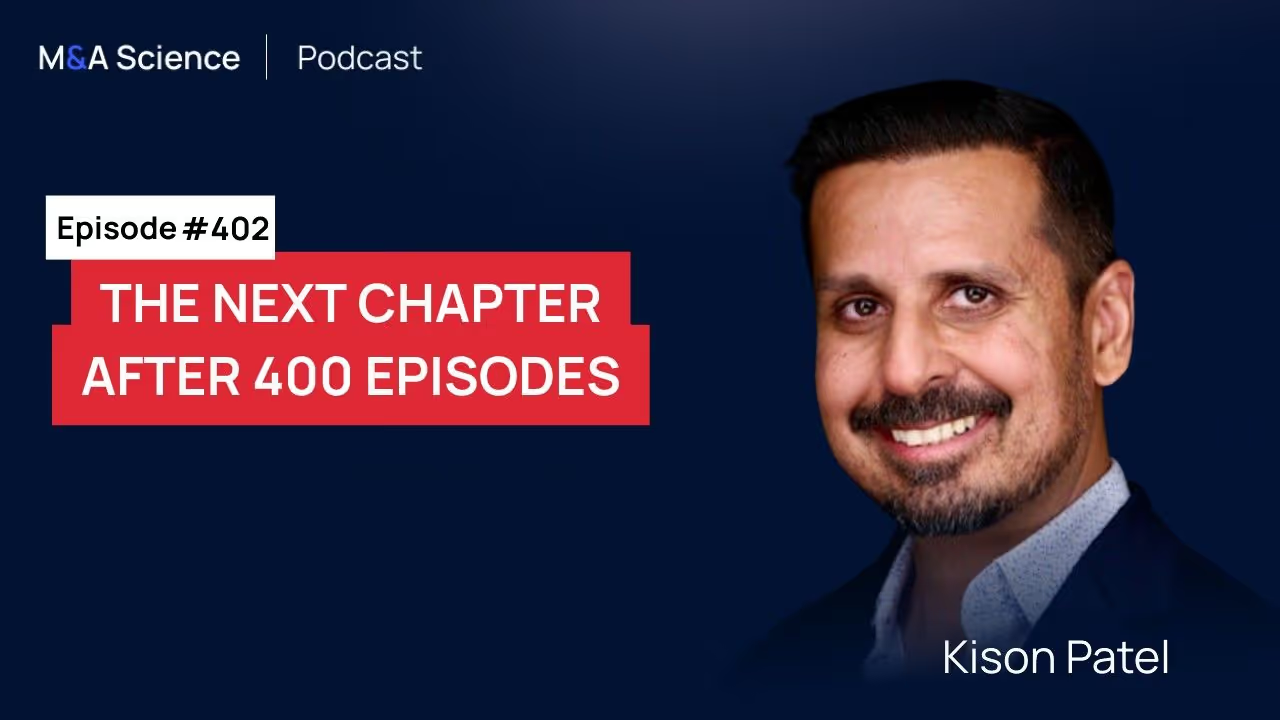_Easy-Resize.com.avif)
Kunal Jain
Episode Transcript
Text Version of the Interview
Changes in the Current M&A Market
It's been a crazy market. I spend half my time thinking about how we evolve our processes for the new market. And we are no longer giving away exclusivity periods due to the volume of interested buyers.
We are just adapting to the market. I don't think it's the opportune way to run deals that maximize value or create the most goodwill to the buyers, especially those who are not the winners.
It crowds out certain people who can't compete in these types of more cutthroat and competitive processes. It's tricky and challenging.
We're forcing people's hands early and saying, this is what we're going to give you. If you don't want to win, somebody else will, so we need you to deliver a full package with what we've given you.
Exclusivity Period
In the last six or seven deals, I've done, I granted exclusivity once with more than a week of lead time.
In one of those deals, I did have to give a party about three weeks of exclusivity. That was because I had zero leverage in this deal. I had a buyer who was two turns of value above everybody else. And my client would only transact at that value. So I had to pursue that path.
If I'm running this deal myself, I'm taking multiple parties to the finish, and I still probably don't get the same value. That deal did get done. But the three weeks ended up being five weeks of exclusivity before that all finished. The client really forced our hand.
But otherwise, I'm giving folks three to seven days of exclusivity once everything has been locked down to get to a signing. Once they've navigated the whole process, and I basically have full conviction that they're going to win.
Integration Planning
I'm going to tell you something that is pretty cutthroat. In my shoes, with this market, I could frankly care less about the buyer's desire for post-integration planning, and that couldn't be further from my mind in terms of priorities.
When you talk about confirmatory diligence, I'm looking for 80% of that to be done by signing an LOI.
Two years ago, we would have a whole process of value-driving business diligence to get done. You sign the LOI and then have a whole confirmatory diligence phase. Well, not anymore.
Now, you can only do confirmatory diligence on the distributor contracts and highly sensitive information that needs to be reviewed like customer calls, supplier calls, in the end. Otherwise, if this is a competitive bank process, everything else is done. Part of this speaks to the leverage I have.
If I have three or four buyers, which I have in most of my deals, you don't get exclusivity and the path to do that final confirmatory work unless you've given me a fully-baked contract with price and full equity backstop.
It's remarkable how this is all working. So you have to be a little bit thoughtful about the company's quality and the process you're running. And if you can do these deals publicly with rep and warranty insurance, the better.
That's what I'm doing at 95% of my deals. Occasionally, I have to have a soft indemnity, especially if I have no leverage. But even then, I'm still not giving them multiple weeks of exclusivity to work for confirmatory.
If the buyer wants to talk about integration, they need to do that in our diligence process. It's not going to slow our timeline because we will pick a party for a signing based on a fully robust package.
Our client needs to feel that no outs will derail this deal. The deal will get signed in a matter of days, not weeks. So that's what we're always thinking about.
Everything that I focus on is how I push buyers to deliver a full contract, a full LOI that is as competitive as possible and it's as fully baked as possible and as fast as possible.
Strategic Buyers vs. PE firms
What I'm not seeing in this market is a strategic or corporate group that doesn't know a business well before the process comes to market, winning.
If it's a business that they haven't thought about or haven't internally discussed or strategized about, they're not going to be able to out-compete the PE firms. Maybe they can pay more, but that's usually derived by synergies derived by a real recognition of the opportunity.
I've had several instances where I thought the strategic buyers would win, but it never worked this year. Part of it was speed where the process was moving and they couldn't adapt to the climate.
And part of it was, as they got deeper into the diligence, they realized that the price they had initially put out there was not going to be the price that they could maintain.
In terms of feedback for them, you need to identify early on. Because in these processes, we're giving you time to react, but what I'm often seeing is, they show some interest, they put a really good bid out there. But they're just coasting in that first phase.
However, private equity firms that have never seen the business before or have little familiarity start getting aggressive early. They call us and request a fireside chat and access the management.
I'm not seeing that in strategic buyers. You need to get the wheels moving early. You need to get me, as the banker, plugged in and show me that you're very serious about this. Not just because you put a big number out there at the IOI phase, but because you're aligning resources and shifting priorities within your organization to go after this.
And then, we can start to chart a path. What often happens is, within this full process, I'm creating paths for selected buyers, and I'm giving preferential access to certain groups where I feel it makes sense. And that happens all the time.
And the strategic buyers need that to be competitive and stay afloat with those private equity firms because all of our processes are quick now.
Normally, post-IOI, you're getting six weeks to get everything done, including full contract markup, business diligence, and most of the confirmatory work. You need to deliver a full package, and we're asking you to sign a deal within a week after that. That's crazy, but that's what the pace is.
It's been really tough, and strategic buyers are losing more than I've ever seen.
Advice to Strategic Buyers
Timing Matters. It's either you don't know this company very well, so you have to mobilize your team, or you do know the company, and you have a view of which companies you want to own. You need to be proactive, whatever your situation is. It's not to your advantage to compete as a corporate in a bank process.
I just did a buy-side deal where the buyer went to the owner of the target company and told them they wanted to acquire the business right now. With a quick market check, the buyer came out on top.
Do they win if they wait for an auction process? We don't know. But it certainly becomes competitive. Maybe someone wants to pay 20 times EBITDA, and they only paid 17.
So be aggressive, find the businesses you want to own and make it very clear. Tell them you want to go directly to the owner if you have a banking relationship.
Because I'm often seeing the right buyer lose because they wait around for the business to come to them, and it moves away. And timing is really important. If you're coming to them as the buyer and telling them you want to acquire them, it's probably because the timing is opportune for you.
When we call these corporates that a business is going to market in a month, they aren't ready for it. That's problematic, and that's partly why they can't compete with PE firms.
PE can drop everything so easily. It doesn't matter what's going on. If this is an interesting business and the cash flows work, they don't have to worry about the synergies, and they just care about cash flows.
PE firms can put an IOI together in a week and a half. They can do their diligence in five weeks, despite not knowing the company's name two weeks ago. Strategic buyers can't do that.
So maybe try to be a little bit more aggressive. And if they can't take it off the table early, they need to prepare their teams for that timeline. Be proactive about it because it won't work if you wait.
How can Tools Help Strategic Buyers?
One struggle I often see is that these guys don't have systems to accurately and communicatively track what they need to be doing and the follow-up within their pipeline.
They need to do everything they can to avoid the banking process. Because it's tough. If you've waited to that point, it's just a mad freaking scramble. They just have to adapt to whatever our process is. They can't take their time and figure out how to best compete anymore.
Tools can't help them compete in our process. When I first started six years ago, we were using excel trackers. It seems outdated, but we haven't moved off of it. We're still sending these trackers every day to our buyers and clients. And it's just a back and forth.
So the buyers can take that tracker and try to put it into a new platform, but what I know is I need the deal to keep moving quickly. And I'm going to keep sending it my way in my tracker.
These buyers just have to adapt to our timing and if they can't, they flake and somebody else buys it.
Banker's Fee
I think many firms are doing well, but I think Blair's doing exceptionally well because healthcare and technology are driving it, but a lot of it is just getting crazy.
Now there are two ways to get revenue. We get a lot of deals done, and we get paid a lot more for the deals we're getting done. The difference this year is that we're getting more deals, which are exceptional fees, and we're pricing them in a way that there are kickers.
Maybe you're getting paid a percentage and a half for a normal fee, but then above a certain amount, you're getting five or seven or eight or 9%. How are we getting paid that crazy amount? Incredible competition for businesses.
We have PE firms paying 50 more just to own a company. That's what keeps happening. When I started here, you had 5% of your deals in that kind of incentive land. And now it's a third or more, and it's all pure profit.
We're being so much smarter. We're doing so much analytics these days around:
- How do you price?
- What are the right deals?
- What characteristics of a deal make it likely to generate outlier outcomes?
- What are the characteristics of deals that are likely to be dragged on your team and not get done?
And we're quantifying all that through AI before we accept any mandate. We're giving them a score, and if they don't have a certain passing score, You have to explain why you take on that deal.
It's mostly financial-based, but there are other little things like:
- The percentage of customer concentration.
- Is there a failed process in the last two years?
- Is there a turnover at the CEO position in the last 12 months?
We look at certain things that impact deals too. And you have some system that in the backend works through all that. But a lot of it is financial.
We evaluate this every week. This is our pitch approval process and what each deal looks like. This is what the scores were for those deals. Let's talk about it. Some of them, we don't pursue, some we dictate the price and go from there.
We're studying the impact of the hours that your team works from a productivity perspective and a revenue generation perspective. And that's not just for the partners; that's for the analysts and everybody through.
So all the deals that you work on must get done. You want to price them well and get the max fee, but you also want to pick the right one. And then when you do have the right ones, you want to run really efficient targeted processes that are highly competitive that leads to all the dynamics we were just talking about.
Permanent Changes in the Market?
Things have already slowed down, especially in the fourth quarter of this year. That's not to say that deals aren't getting done, but we're not seeing a feeding frenzy compared to what we saw in the summertime, where literally people were crawling over average businesses like cockroaches.
Now post-labor day, we've seen a lot of funds have deployed. Capital folks are feeling like they don't want to get too over-invested right now. We've had really good businesses not get the same type of interest as we would have expected.
The number of buyers we're calling in processes is lower than the last three years, and every quarter it's actually going down. So we are now being selective on who we call, and we want to run a tighter process.
If you call 200 buyers versus 40 buyers, it's a longer process timeline. And we want to run tight processes with buyers who we know are actionable and who can get things done. If you have to educate buyers on something. The likelihood that they win is low and it's more of a drag on management's time and the banker's time.
We're doing more fireside chats upfront with groups that we know in tighter, just overall processes.
But for the permanent changes, these deals will move quickly. Timelines are shorter, and they're not going to get longer. So upfront education is more important than ever. A large percentage of the deals we do, the winners spent time early in the process.
They're not just coming out at the LOI phase and there's good communication and discussion at the early stage of these processes.
Benefits of Compressed Timeline
There's always this appreciation that the greatest risk to deals is time. So we have no interest in long exclusivity periods because you lose leverage.
If I grant you three weeks of exclusivity as a corporate buyer, then can't talk to any other buyers during that time. You can work through and potentially decide that this is not the deal for you. And then I have to go back, groveling to my old buyers and re-engage.
That is no position to be in. And we're trying to avoid that at all costs. It's not so much about having the timeline be as short as possible - It's to have the timeline to be tight and efficient.
If in the past we were taking ten buyers to the next phase, post LOI and a very competitive auction, now we'll take five and have more focused time with them.
If we think that there's a very high likelihood that one of them produces a great outcome for our clients, then it reduces the extra work for those additional 5 that won't win anyways.
We're going to push all of these guys as hard as we can. There's going to be some natural fallout so that 3 of them are ready to sign a deal days after they submit their package, and that's our focus.
And if that takes an extra couple of weeks in that diligence phase, that's fine. I'm okay with that because it's productive time that reduces the risk on the backend.
So everything is about risk mediation. It's not necessarily about value maximization, and it's about certainty to close. In these competitive businesses, the market and the competition drives value maximization.
But our role is to get great deals and optionality for our clients that creates deal certainty. That's what I always think about is my obligations to my client; it's not value maximization.
What I normally do in those final stages is, if I have two or three buyers who are coming at me aggressively, at some point, I'm going to give one buyer a path to win.
I will give them clear instructions of what it will take for them to win this deal. You're going to have to move your bid to 15 million and reduce your timeline to sign by half, things like that.
It's a very clear message of congratulations. This is what it's going to take to win; if you can't make this work, then I have another phone call to make.
Three months ago, it was a little different. The conversation was different, and the market was bananas but now it's a lot more deal-making. I don't think I've ever been in this business where deal-making is so important, and it's like match-making.
Improving Banking Process
We're also being creative with technology. I had two founder-owned businesses, and they were very much under the radar. And this business alone would have a short-list of 40 potential buyers. But I can't do 40 fireside chat meetings.
To educate folks on this, we recorded a fireside chat with our team regarding all the questions we know they will ask. We didn't allow any fireside chats, but we sent this recording to those people.
We probably did ten real fireside chats virtually, and then we sent it to another 20 or 30. And through that site, we could track:
- Who's looking at what?
- For how long?
- What pages are they focused on?
- Which level of people within each organization is looking at it?
This is all pre-IOI, and this is early engagement. We're just trying to get a read of who will spend the time looking at it, learning about it, asking us questions.
We're just trying to do everything we can to get smart about these buyers and their willingness to engage in a pretty cutthroat competitive process post IOI.
M&A Software for optimizing the M&A lifecycle- pipeline to diligence to integration
Explore dealroom

Want to wear your M&A expertise?
Check out the M&A Science store.





